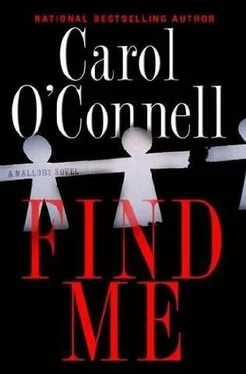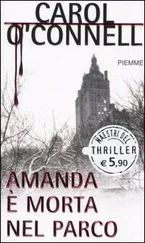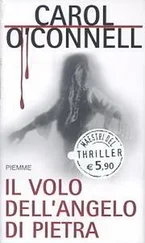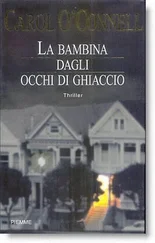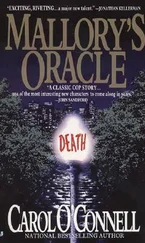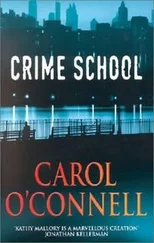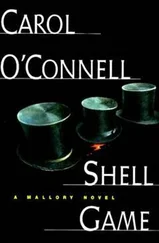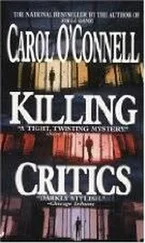Ah, but Mallory had lost her dark glasses. She had laid them down on the motel reception desk alongside her car keys while checking out this morning. That was the last time she remembered seeing them, and now they were lost. And her mind-lost.
Dead April prattled on as they drove down the road.
Click.
The Volkswagen convertible was far away now, reduced to a small silver dot in the dark eye of a camera. The photographer held a pair of aviator sunglasses with gold rims. A tongue flicked in and out, as if it were possible to taste Mallory by licking the lenses. The sunglasses were folded away in the glove compartment to join the young detective’s stolen cavern brochure, a pen and a napkin that she had once used. A long-range plan was forming, piece by piece of her.
Mallory entered the state of Texas miles and hours ahead of the caravan. Stopping in the small town of Shamrock, she made her duty call to the U-Drop Inn, but it was too early in the day to find this landmark saloon open for business. She only stayed long enough to make a checkmark on her list of things to see. She had greater hopes for the next stop.
She traveled westward toward the map coordinates for a patch of dirt, then pulled off the road and stopped the car on a flat Texas prairie “-with a vista that went to the end of the world.” She stepped out and walked toward the horizon line. Every sign of life on earth was behind her and out of sight.
And she waited.
“There is only one way to see America,” wrote Peyton Hale. “An airplane or a train won’t do. You have to feel the earth underfoot. You must be alone and in danger of losing your way. Oh, the sheer size of this country can send a man to his knees. This prairie, this great expanse of open space has that power. It’s the overwhelming sense of emptiness you feel. Only a few steps away from the road and you’re lost-and then you’re changed.”
Without once falling to her knees and unchanged in any way, Mallory returned to the car, where she opened her notebook and crossed off one more disappointment.
Not his fault.
For her, the sense of emptiness was the familiar thing.
After driving only a few miles, she summoned up a passenger. Sometimes there were so many ghosts in the car that Mallory could not breathe. This time the murder victim was forced to ride in the back seat. Mallory could not quite let go of April Waylon, but, dead or alive, the woman was annoying.
The recently killed mother caught her eye in the rearview mirror and smiled. Dead April leaned forward to say, “It wasn’t your fault, you know. I mean-my murder. You can’t be expected to save the same people over and over again.” In Mallory’s mind, a door suddenly appeared in the back seat of a two-door convertible. It flew open, and April was pushed out of the car.
Her foster mother, Helen Markowitz, was resurrected to ride in the front seat. Mallory had restored the soft roundness that had been lost to cancer years ago.
Gentle Helen, never leave me.
“Oh, Kathy, just look at this mess.” The dead woman was staring at the empty soda cans and wadded-up credit-card receipts that littered the floor mat. There was no derision in Helen’s t o ne. She had been the kindest of people-and the neatest. Everything Mallory knew about cleaning solvents and dust mites she had learned from this extraordinary housekeeper, and then she had taken it to great extremes, never tolerating one thing out of place and not one spot of dirt, not one-
“Something’s gone wrong,” said Helen, frowning at the discarded paper cups. “This is not like you, Kathy.” Tactfully, the late Helen Markowitz said nothing about the dust on the dashboard, but Mallory noticed it and silently inventoried other signs of trouble: a chipped fingernail, a windshield covered with bugs, and a lying mirror that showed her eyes full of tears. But her face was dry. Maybe these were her father’s green eyes- his tears.
At the last stop in Oklahoma, when all the people had been fed and the reporters, too, Riker went over the same instructions for parents who had recently joined up. The ranks of the caravan had swelled to fill every bit of the lot. “Pump your own gas. Don’t leave your car unattended anywhere on this road.”
The FBI and local police had managed to contain the detail of victim mutilation, the chopped-off right hands, but the press had acquired the news and names of the murdered caravan parents. And now Dr. Magritte was allowed to convene the campers in a minute of silent prayer for those who had lost their lives on Route 66. The prayer group was hardly a tableau of statues in silent reverence. They were antsy, feet shifting, anxious to be gone-and smiling.
Riker understood. One of their number had died yesterday, but they were still alive. Civilians and their television ideas of murder-they believed that everything would be all right if they only followed the good camper’s guidelines for traversing a road of sudden death.
“It might be a mistake to give them rules.” Charles Butler was obviously in the mind-reading mode as he sipped coffee from a paper cup. “Makes it all a bit too innocent-like a school field trip.”
“I’d like to clear them all off the road.” Riker shrugged. “But I can’t d o that without an act of Congress. The feds want the parents here.”
“As bait?”
“Yeah, but even if I spelled that out for these people, they still wouldn’t leave. Every time somebody dies, they think they’re getting a little closer to finding their kids. And they’re right about that. Cold, huh?”
Mallory barreled down the road with the volume turned up sky high, and a group called The Who sang, “Won’t get fooled again.”
Was this the one?
Back in New York City, she had asked, “What was my father’s favorite song?”
“There were so many,” Savannah had said, unwilling to admit that she did not know.
And thereafter, Mallory had played a waiting game until one truth emerged and then another. Her enemy had weakened more each day.
Savannah Sirus was one dead woman who would never come for a ride in this car.
She-would-not- dare.
Mallory rejoined the old road and entered a small Texas town. This was the home of Peyton Hale’s beloved Avalon Theater, a going concern when his letter was written. It was closed now. The movie posters had all come down, and the doors were padlocked. The glass of the ticket booth was cracked, and a nearby sign proclaimed this place as a landmark. The silver convertible was the only car on the street. Every parking space was hers for the taking. She had seen other ghost towns along the way, but there were people living in this one. A few of the storefronts were not empty, and one was a town museum that still posted hours.
A diehard town.
She crossed the old theater off her list with no sense of letdown this time. She had come to understand this kind of landmark, “-like a bookmark for a memory.”
Down the road, she found the old Phillips 66 gas station, a tiny house of brick that had been restored for appearance only; it no longer pumped gas. Beyond that was a likely patch of road to bury a body, and troopers were hard at work digging it up. Kronewald’s pattern for the children’s graves was holding up in the state of Texas.
She passed the diggers by. The young detective had had enough of the dead today, both the people and the places. Her car had been emptied of ghosts, and she was done with death. She rejoined the section of newer highway that had displaced the old Route 66 and put on some speed. The music was faster now, more frantic.
Читать дальше
